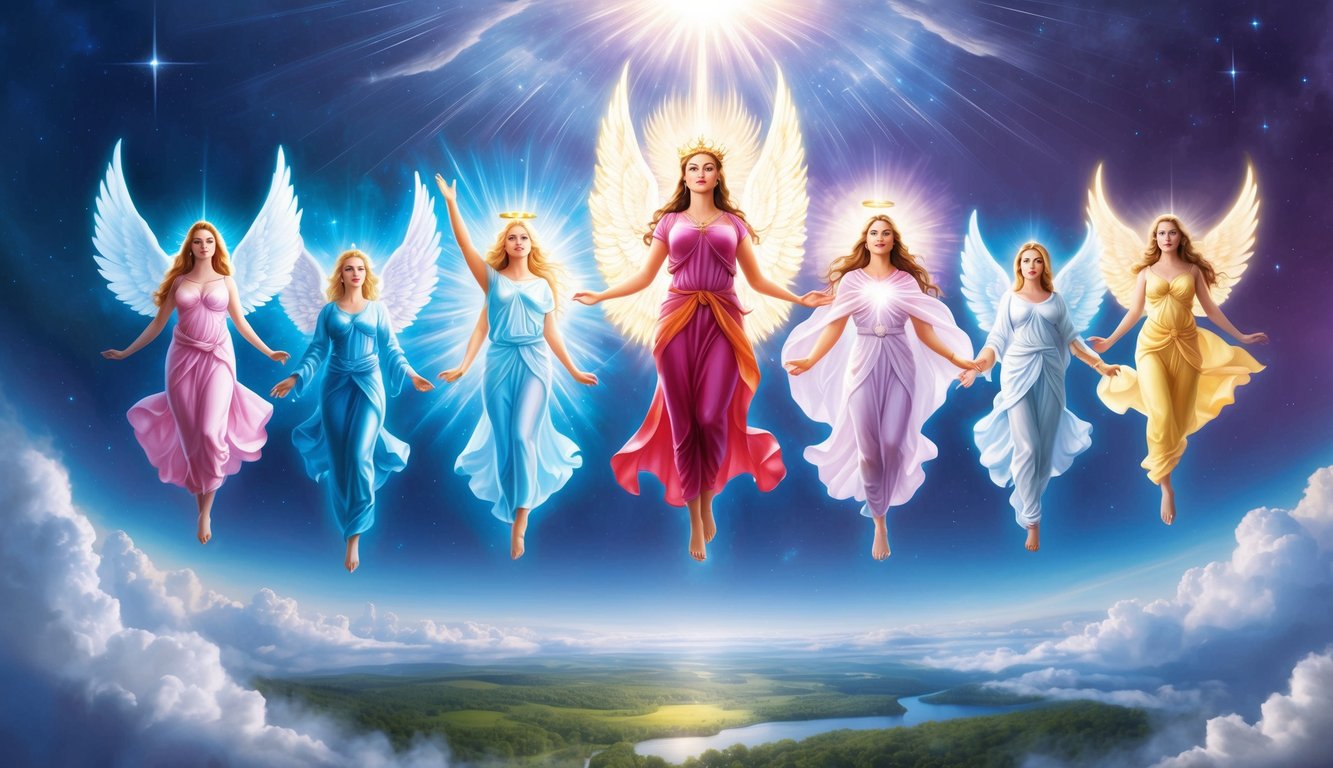Don’t Miss Out On This Unique Astrological Opportunity
Are you tired of spinning your wheels and getting nowhere? Simply put, you’re out of sync: you’re out of alignment with your astral configuration.
But: there’s a kind of map that can help you reclaim your alignment. Think of it as your own personal blueprint to success and happiness: a blueprint that will help you live your most amazing life.
Get started here.
Exploring the concept of the Seven Spirits of God is like uncovering a fascinating part of Christian theology. Some believe the Seven Spirits of God represent different attributes of the Holy Spirit, offering guidance and wisdom to believers. You may have encountered references to these spirits in various religious texts or discussions, sparking your curiosity about their significance.
In the Christian context, the Seven Spirits are sometimes seen as a way to understand the diverse and powerful nature of the Holy Spirit.
Each spirit embodies different qualities that can strengthen your faith and deepen your spiritual journey.
By reflecting on these aspects, you might find new layers of meaning in your relationship with God.
As you dive deeper into this topic, you might discover different interpretations and teachings that reveal new insights into your faith.
Whether you’re a seasoned believer or someone just starting to explore Christianity, the Seven Spirits offer a unique perspective on understanding the divine presence in your life.
Biblical Origins and References
When exploring the “seven spirits of God,” you will find important connections throughout the Bible.
This idea is prominently featured in the Book of Revelation and can also be linked to prophetic writings in Isaiah and other biblical texts.
These references help bridge the Old Testament with the New Testament.
Revelation and Its Symbols
The Book of Revelation is where the term “seven spirits of God” appears most vividly.
It’s mentioned in a few key passages, such as Revelation 1:4, which connects these spirits with the throne of God.
The imagery is symbolic, representing the fullness and completeness of the Holy Spirit.
Revelation also links the seven spirits to the seven lamps burning before the throne and the seven stars held by the Son of Man.
This symbology might suggest the presence and work of God in the world.
Such vivid representations emphasize the importance of divine wisdom and power in Christian teachings.
Prophetic Context in Isaiah
Isaiah offers another perspective on the seven spirits through a prophetic lens.
Isaiah 11:2 speaks of the Spirit of the Lord resting upon the Lamb of God, identifying characteristics like wisdom, understanding, and strength.
This passage is thought to provide a framework for understanding the attributes of the seven spirits.
These descriptions broaden the perspective by emphasizing different aspects of God’s Spirit.
The idea here is that the Holy Spirit embodies multiple qualities, which enrich your faith experience.
By looking at Isaiah’s prophecy, you may find deeper insight into how these attributes impact your life and faith journey.
Old Testament and New Testament Connections
Connections between the Old and New Testaments are essential in understanding the seven spirits.
The Old Testament leads into the New Testament, building a cohesive story about the Spirit’s role throughout biblical history.
In instances like the visions of the Throne in both Isaiah and Revelation, these links become more apparent.
For believers, these connections highlight a balanced and powerful image of God’s divine presence.
They show how spiritual themes recur and gain depth, helping you see the Bible as a unified text.
This continuity can deepen your appreciation of the scripture and its teachings on the Holy Spirit.
Theological Interpretations
In studying the “seven spirits of God,” you encounter ideas such as wisdom, counsel, and might, often symbolizing spiritual completeness.
Influenced by passages like Isaiah 11:2, these interpretations explore symbolic meanings.
Spiritual Significance of the Number Seven
The number seven frequently appears in the Bible, often symbolizing perfection and completeness.
When you look at the “seven spirits of God,” you might connect them to attributes of God, each reflecting different aspects of divine nature, like wisdom and understanding.
In Isaiah 11, the prophet speaks of the Spirit resting upon a future leader, often interpreted as Christ.
This Spirit embodies wisdom, understanding, and knowledge.
It signifies the full and complete work of God’s Spirit.
Scholars link this to perfection, representing fullness in divine purpose.
Roles and Symbols of the Spirits
Each of the “seven spirits” plays a unique role, representing different facets of God’s nature.
For example, the spirit of wisdom involves making choices that align with God’s will.
The spirit of knowledge focuses on deep insight and truth.
The spirit of might relates to power and strength, helping you overcome challenges.
The spirit of the fear of the Lord involves reverence and respect for God.
Emphasized in Isaiah 11:2, these spirits provide a comprehensive view of divine guidance, assisting believers in their spiritual journey.
The “spirit of counsel and might” depicts practical guidance empowered by strength.
Representations in Christian Liturgy and Art

In Christianity, the seven spirits of God hold significant meaning, often symbolized by elements like lamps, eyes, and fire.
These symbols are crucial in depicting spiritual truths across art and liturgical practices.
Artistic Depictions of the Seven Spirits
In Christian art, the seven spirits are often represented through symbols like doves or lamps.
For example, artistic depictions may use seven doves to symbolize these spirits, connecting them to the Holy Spirit and its gifts.
This imagery can be found in paintings depicting the Trinity or the Baptism of Jesus, emphasizing the presence of divine guidance and wisdom.
Additionally, icons might incorporate images of lamps or eyes, symbolizing enlightenment and divine vision.
Cherubim and the throne of God might also appear, illustrating the heavenly realm where these spirits dwell.
These elements work together to convey messages about creation and the spiritual mysteries of faith, often presented in vivid colors and forms.
Liturgy and Ritual References
In liturgical contexts, references to the seven spirits are woven into various rituals and prayers.
These spirits highlight different divine attributes, often described in hymns or scripture readings.
The presence of fire in ceremonies, for instance, symbolizes the purifying and enlightening role of these spirits.
Rituals may include the lighting of seven lamps, each representing a different spirit.
These practices underscore the connection of the worship setting to the throne of God, where the spirits are believed to be ever-present.
Such representations in church settings contribute to a deeper spiritual engagement, reminding you of the divine guidance present in your worship and the broader tenets of Christianity.
These rituals aim to foster a connection to the spiritual realm and the everlasting truths of faith.
Practical Reflections and Devotional Aspects

Exploring the seven spirits of God encourages you to deepen your faith and seek a closer connection with Christ.
Engaging with spiritual gifts and understanding their relevance in modern Christianity can bring guidance and peace to your faith journey.
Living Out the Sevenfold Spirit in Faith
Living out the sevenfold spirit means integrating qualities like wisdom, understanding, and holiness into your daily life.
In practical terms, this can involve seeking peace and guidance through prayer and meditation.
As you embody these spiritual aspects, your actions can reflect the grace of Christ, impacting those around you.
Participating in church activities is another way to express these qualities.
Engaging with church communities can help you nurture your faith, offering opportunities for reflection and the sharing of experiences.
This helps to create a supportive environment for everyone involved, fostering love and mutual growth.
Seeking Spiritual Gifts in Modern Christianity
Identifying and nurturing spiritual gifts in modern Christianity can bring new dimensions to your faith.
These gifts, like teaching or healing, are meant to serve others and enhance the communal life of churches.
When you recognize your gifts, you contribute to the spiritual growth of your community on earth.
You are encouraged to develop these gifts through prayer, study, and practice.
This pursuit can deepen your relationship with God and the individuals around you.
Helping others with your gifts is an expression of grace and aligns your life more closely with Christ’s teachings, bringing about a more vibrant and engaged faith experience.
The Seven Spirits in Contemporary Theology

In contemporary theology, the Seven Spirits mentioned in the Book of Revelation are often explored through various scholarly and comparative lenses.
These interpretations consider their roles in prophecy and connections to broader theological themes such as salvation and the trinity.
Modern Scholarly Perspectives
Modern scholars have looked at the Seven Spirits to deepen our understanding of Christian theology.
Some experts link the spirits to the presence of the Holy Spirit around the throne of God, representing completeness and divine guidance.
In Revelation, the Seven Spirits are seen as interconnected with Jesus Christ, conveying messages of grace and peace to the early churches, like the Church in Sardis.
The spirits are sometimes viewed as angelic beings, linked to prophecy and the work of John.
They are considered helpers in spreading salvation and contributing to the mission of the Messiah, often reflected in church teachings.
Comparative Religion Studies
Comparative studies examine how different faith traditions view the Seven Spirits.
In Christian theology, they could symbolize various divine attributes or energies actively working in the world.
These spirits emphasize the role of the savior and the desire for salvation.
In some interpretations, believers see them as guiding people toward God’s grace and peace, much like angels.
This comparative approach also sheds light on cross-cultural views about divinity and spirituality.
It offers interpretations that bridge different faiths and the core beliefs of Christianity.
Understanding these perspectives helps you see how themes like prophecy and divine intervention resonate across religious landscapes.



